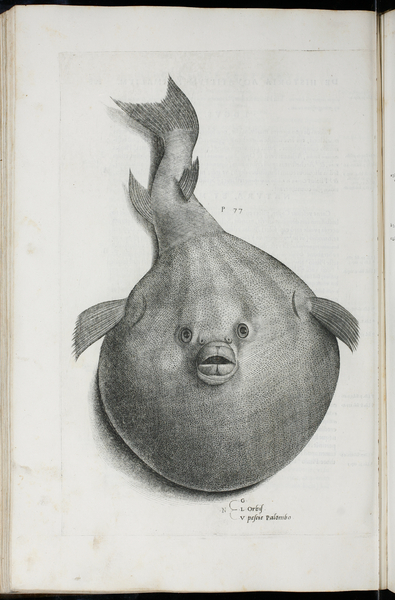 The Aquatilium animalium historiae was published in Rome in 1554 and is populated with 81 engravings of aquatic creatures by Antoine Lafréry and Nicolas Beatrizet. Salviani’s work is the first to use the technique of copper engraving for depicting fishes. The silvery, finely hatched lines of copper engraving represents the physical nature of fishes far more successfully than woodcuts. Lafréry and Beatrizet’s illustrations were ahead of their time, and their skill in depicting fish was unmatched for over a century. The book not only describes the different Mediterranean fishes, molluscs, and cephalopods, but includes information on capture techniques, nutritional value, and preparation.
The Aquatilium animalium historiae was published in Rome in 1554 and is populated with 81 engravings of aquatic creatures by Antoine Lafréry and Nicolas Beatrizet. Salviani’s work is the first to use the technique of copper engraving for depicting fishes. The silvery, finely hatched lines of copper engraving represents the physical nature of fishes far more successfully than woodcuts. Lafréry and Beatrizet’s illustrations were ahead of their time, and their skill in depicting fish was unmatched for over a century. The book not only describes the different Mediterranean fishes, molluscs, and cephalopods, but includes information on capture techniques, nutritional value, and preparation.
“Serpent Marina.” Aquatilium animalium historia, liber primus (Ippolito Salviani, 1554).

“Orbis. Pesci Palombo.” Aquatilium animalium historia, liber primus (Ippolito Salviani, 1554).
As a part-time employee at the Library, having briefly studied the Paris Commune (1871) some 10 years previously, in 2005 I was intrigued to find myself digitizing an original edition of Le Ballon Poste: Journal du Siege de Paris (1870–1871) for the Paris: Capital of the Nineteenth Century project. At the time, the newspaper was captured on the department’s Phase One PowerPhase FX+ scan-back system, with white paper placed underneath each page view, to enhance the legibility of print on the semi-transparent, very thin India paper.
Shown here is a close-up of the address panel, which gives a better sense of the fragility and lightness of each issue, delivered via hot air balloon.

(The French National Library now also hosts digital facsimiles of the newspaper issues.)
The French balloons are featured in this print held in Brown University Library’s Anne S. K. Brown Military collection, picturing a German soldier becoming distracted by a balloon overhead. The Brown University Library’s digital collections, culled from special collections, currently include over 100 items relating to the Franco-Prussian War, the conflict immediately preceding the Commune.
Today, September 21, 2012, is the anniversary of the Great Hurricane of 1938 which struck New England, killing approximately 600 people and causing millions of dollars in damage.
As a typical New Englander who is obsessed with weather-watching, I was excited to find this recording of barometric pressure for the week of the hurricane among the items Digital Production Services has digitized for the Ladd Observatory. The enormous dip in the pressure occurred the day of the hurricane.

Although Brown was fortunate in that it did not experience the same level of devastation which hit much of the state, there was still damage. Here an automobile (can you identify it?) is crushed by one of the stately trees on the campus.

 The Aquatilium animalium historiae was published in Rome in 1554 and is populated with 81 engravings of aquatic creatures by Antoine Lafréry and Nicolas Beatrizet. Salviani’s work is the first to use the technique of copper engraving for depicting fishes. The silvery, finely hatched lines of copper engraving represents the physical nature of fishes far more successfully than woodcuts. Lafréry and Beatrizet’s illustrations were ahead of their time, and their skill in depicting fish was unmatched for over a century. The book not only describes the different Mediterranean fishes, molluscs, and cephalopods, but includes information on capture techniques, nutritional value, and preparation.
The Aquatilium animalium historiae was published in Rome in 1554 and is populated with 81 engravings of aquatic creatures by Antoine Lafréry and Nicolas Beatrizet. Salviani’s work is the first to use the technique of copper engraving for depicting fishes. The silvery, finely hatched lines of copper engraving represents the physical nature of fishes far more successfully than woodcuts. Lafréry and Beatrizet’s illustrations were ahead of their time, and their skill in depicting fish was unmatched for over a century. The book not only describes the different Mediterranean fishes, molluscs, and cephalopods, but includes information on capture techniques, nutritional value, and preparation.



